French actor Jean Desailly (1920-2008) was a member of the Comédie-Française from 1942 to 1946 and later participated in about ninety films. He achieved his greatest popularity in the 1940s and 1950s. For sixty years, he formed a celebrated married theatrical couple with his second wife, Simone Valère.
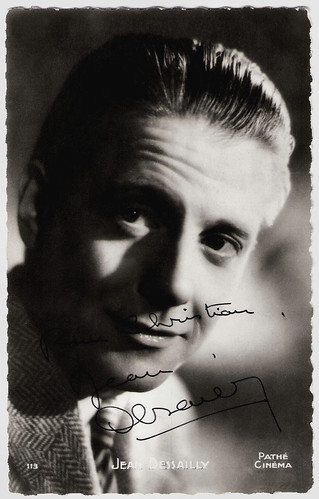
French postcard by Editions P.I., Paris, no. 113. Photo: Pathé Cinéma.
Jean Desailly was born in Paris in 1920. His father was the composer Reynaldo Hahn’s secretary.
Jean studied at the École nationale supérieure des Beaux-Arts with the intention of becoming a commercial artist. At the same time, he was acting in an itinerant theatre company, La Roulette, and then chose to attend the Conservatoire de Paris where he left with the first acting prize.
In 1942, he joined the Comédie-Française. In 1943, he created Paul Claudel's Soulier de satin with Madeleine Renaud under the direction of Jean-Louis Barrault.
In the cinema, he starred in the murder mystery Le voyageur de la Toussaint/Traveler on All Saints' Day (Louis Daquin, 1943) about a young man who returns to his hometown of La Rochelle and becomes the unexpected heir to a large fortune. He is confronted with ‘the syndicate’, a powerful bourgeois family who has always despised his parents because they were music hall artists. The film was an adaptation of a story by Georges Simenon, Desailly’s favourite writer and co-starred Assia Noris, Jules Berry and Simone Valère, with whom he fell in love.
D.B. Dumonteil at IMDb: “Jean Desailly (debut) as the innocent young man gives a sensitive and heart-warming performance. His smile lightens this dark atmosphere along with that of his uncle's young widow, an ex-usherette whom the whole family despises as well.”
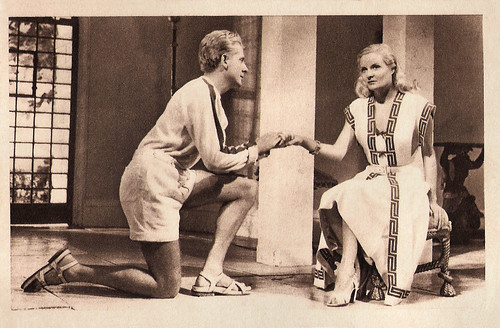
French postcard. This postcard was made for the exclusive release at the Madeleine cinema. Photo: Prod. CAPAC. Jean Desailly and Madeleine Sologne in Une grande fille toute simple/Just a Big Simple Girl (Jacques Manuel, 1948). The sets were by Robert Gys.
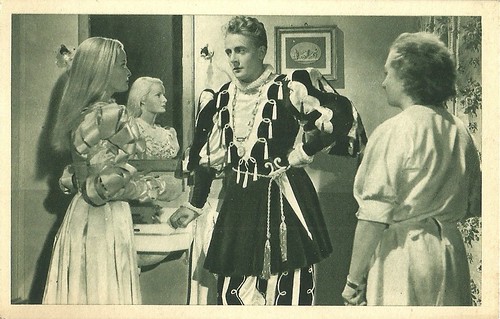
Belgian postcard. Prod. CAPAC. Artistes Associés. Madeleine Sologne and Jean Desailly in Une grande fille toute simple (Jacques Manuel 1948). This card was for the showing of the film at the Palais des Arts/Feestpaleis.
In 1946 Jean Desailly became a leading member of the Jean-Louis Barrault-Madeleine Renaud company at the Théâtre Marigny. There he played in a wide repertoire from Les Fausses Confidences, Bérénice and Le Songe d'une nuit d'été. With the Renaud-Barrault at the Odéon-Théâtre de France, he played both leading roles in le Mariage de Figaro: Figaro on tour in the provinces and Count Almaviva in Paris.
In the cinema, Desailly made an ideal juvenile lead such as the shy suitor of Odette Joyeux, who is enamoured by the ghost of a dead nobleman (Jacques Tati) in Sylvie et le fantôme/Sylvie and the ghost (Claude Autant-Lara, 1946). That year, Desailly also appeared as Pierre Blanchar’s best friend in the costume drama Patrie/Homeland (Louis Daquin, 1946) which was entered into the 1946 Cannes Film Festival, and he played Blanchar’s son in the drama La symphonie pastorale/Pastoral Symphony (Jean Delannoy, 1946).
In the latter, a minister and his son both fall for the same blind young woman (Michèle Morgan). Three years later, the comedy Occupe-toi d'Amélie/Keep an Eye on Amelia (Claude Autant-Lara, 1949) was entered into the Cannes Film Festival. In this Georges Feydeau adaptation, Desailly starred opposite Danielle Darrieux as Amélie.
He then played the title role of Colette's inexperienced gigolo in Chéri (Pierre Billon, 1950). One of his best films is the bittersweet Les Grandes Manœuvres/The Grand Maneuver (René Clair, 1955), starring Michèle Morgan and Gérard Philipe.
It is a charming romantic comedy-drama set in a French provincial town just before World War I. Another success was Maigret tend un piège/Maigret Sets a Trap (Jean Delannoy, 1958) with Jean Gabin as Simenon’s fictional detective Jules Maigret. Desailly shines as the poor but dangerous Maurice, a neurotic, mother-fixated artist. For this role, he was nominated for a BAFTA award, the British Oscar.
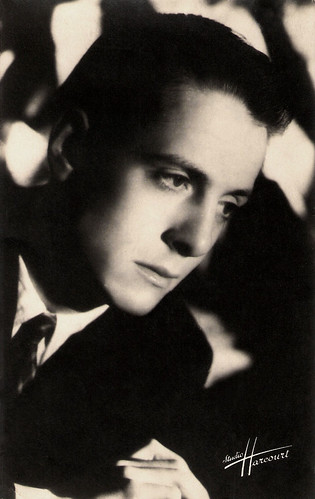
French postcard by Editions O.P., Paris. Photo: Studio Harcourt.
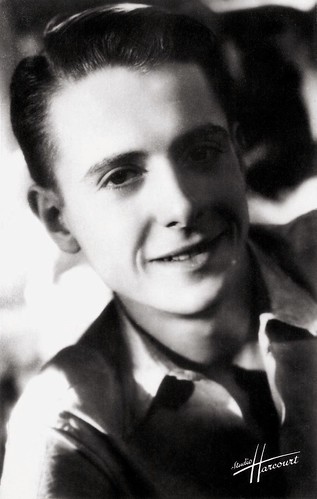
French postcard by Editions O.P., Paris, no. 47. Photo: Studio Harcourt.
During the 1960s and 1970s, Jean Desailly continued to combine the stage with the cinema. He starred in another Simenon adaptation, the murder mystery La mort de Belle/The End of Belle (Édouard Molinaro, 1961) with Alexandra Stewart, and he played a commissioner opposite criminals Jean-Paul Belmondo and Serge Reggiani in the classic crime film Le Doulos/The Finger Man (Jean-Pierre Melville, 1962). ‘Doulos’ refers both to a kind of hat and to the slang term for a police informant.
Desailly had the leading role in La Peau douce/The Soft Skin (François Truffaut, 1964). He played successful, married publisher and lecturer Pierre, who meets a beautiful air hostess (Françoise Dorléac) with whom he has a love affair. He is hiding the affair, but Pierre cannot stand staying away from her. In The Guardian, Ronald Bergan describes it as Desailly’s ‘most famous film portrayal, in which he displayed his discreet bourgeois charm’: “Truffaut described the character as ‘having something childish about him ... a man who is strong in social life but weak in love,’ which is exactly what Desailly depicts.”
Truffaut's own life followed the same path as Desailly’s character when the director left his wife for Françoise Dorléac. Desailly played another man in a marriage crisis in the little-known Dutch film De dans van de reiger/The Heron Dance (Fons Rademakers, 1966) with Gunnel Lindblom.
Desailly was married twice. With his first wife, Nicole, he had two children. In 1998, he married actress Simone Valère after 48 years of living together. In 1968, the couple had left the Jean-Louis Barrault-Madeleine Renaud company and together they formed a new theatre company which they directed successively at the Théâtre Hébertot, the Théâtre Edouard-VII and the Théâtre de la Madeleine. In the following decades, a wide repertoire was played by them at these theatres. Their favourite play was L'Amour Fou by André Roussin, which they performed 450 times.
Desailly’s later films include Un flic/A Cop (1972), the last film directed by Jean-Pierre Melville. Desailly played a small part opposite Alain Delon and Catherine Deneuve, as a distinguished gentleman who is robbed of a statue. A box-office hit was Le Professionnel/The Professional (Georges Lautner, 1981) in which Desailly played a Minister opposite Jean-Paul Belmondo. He also appeared in the comedy La dilettante (Pascal Thomas, 1999), featuring Catherine Friot. In 2001, he and Simone Valère celebrated their 60 years together in the theatre with their final stage success, 'La maison du lac' (On Golden Pond), by Ernest Thompson, directed by Georges Wilson. Desailly was awarded the prestigious Molière Acting Prize in 2002 and he retired. Six years later, in 2008, Jean Desailly died in Paris. He was 87.
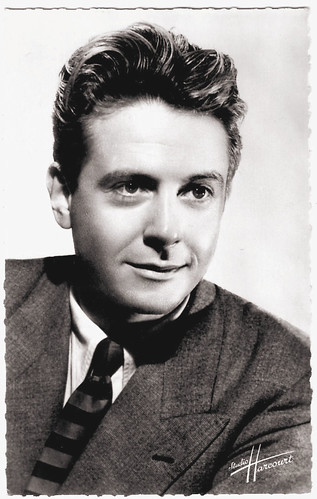
French postcard by Editions du Globe, Paris, no. 176. Photo: Studio Harcourt.
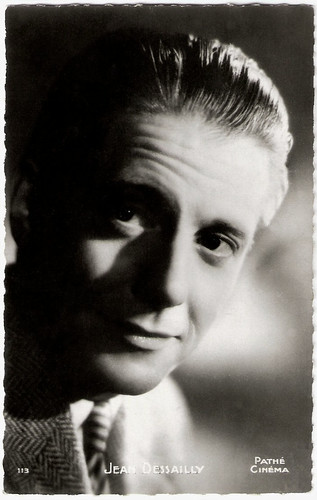
French postcard by Editions P.I., Paris, no. 113. Photo: Pathé Cinéma.
Sources: Ronald Bergan (The Guardian), D.B. Dumonteil (IMDb), Wikipedia (English and French) and IMDb.
This post was last updated on 28 December 2023.

French postcard by Editions P.I., Paris, no. 113. Photo: Pathé Cinéma.
A sensitive and heart-warming performance
Jean Desailly was born in Paris in 1920. His father was the composer Reynaldo Hahn’s secretary.
Jean studied at the École nationale supérieure des Beaux-Arts with the intention of becoming a commercial artist. At the same time, he was acting in an itinerant theatre company, La Roulette, and then chose to attend the Conservatoire de Paris where he left with the first acting prize.
In 1942, he joined the Comédie-Française. In 1943, he created Paul Claudel's Soulier de satin with Madeleine Renaud under the direction of Jean-Louis Barrault.
In the cinema, he starred in the murder mystery Le voyageur de la Toussaint/Traveler on All Saints' Day (Louis Daquin, 1943) about a young man who returns to his hometown of La Rochelle and becomes the unexpected heir to a large fortune. He is confronted with ‘the syndicate’, a powerful bourgeois family who has always despised his parents because they were music hall artists. The film was an adaptation of a story by Georges Simenon, Desailly’s favourite writer and co-starred Assia Noris, Jules Berry and Simone Valère, with whom he fell in love.
D.B. Dumonteil at IMDb: “Jean Desailly (debut) as the innocent young man gives a sensitive and heart-warming performance. His smile lightens this dark atmosphere along with that of his uncle's young widow, an ex-usherette whom the whole family despises as well.”

French postcard. This postcard was made for the exclusive release at the Madeleine cinema. Photo: Prod. CAPAC. Jean Desailly and Madeleine Sologne in Une grande fille toute simple/Just a Big Simple Girl (Jacques Manuel, 1948). The sets were by Robert Gys.

Belgian postcard. Prod. CAPAC. Artistes Associés. Madeleine Sologne and Jean Desailly in Une grande fille toute simple (Jacques Manuel 1948). This card was for the showing of the film at the Palais des Arts/Feestpaleis.
An ideal juvenile lead
In 1946 Jean Desailly became a leading member of the Jean-Louis Barrault-Madeleine Renaud company at the Théâtre Marigny. There he played in a wide repertoire from Les Fausses Confidences, Bérénice and Le Songe d'une nuit d'été. With the Renaud-Barrault at the Odéon-Théâtre de France, he played both leading roles in le Mariage de Figaro: Figaro on tour in the provinces and Count Almaviva in Paris.
In the cinema, Desailly made an ideal juvenile lead such as the shy suitor of Odette Joyeux, who is enamoured by the ghost of a dead nobleman (Jacques Tati) in Sylvie et le fantôme/Sylvie and the ghost (Claude Autant-Lara, 1946). That year, Desailly also appeared as Pierre Blanchar’s best friend in the costume drama Patrie/Homeland (Louis Daquin, 1946) which was entered into the 1946 Cannes Film Festival, and he played Blanchar’s son in the drama La symphonie pastorale/Pastoral Symphony (Jean Delannoy, 1946).
In the latter, a minister and his son both fall for the same blind young woman (Michèle Morgan). Three years later, the comedy Occupe-toi d'Amélie/Keep an Eye on Amelia (Claude Autant-Lara, 1949) was entered into the Cannes Film Festival. In this Georges Feydeau adaptation, Desailly starred opposite Danielle Darrieux as Amélie.
He then played the title role of Colette's inexperienced gigolo in Chéri (Pierre Billon, 1950). One of his best films is the bittersweet Les Grandes Manœuvres/The Grand Maneuver (René Clair, 1955), starring Michèle Morgan and Gérard Philipe.
It is a charming romantic comedy-drama set in a French provincial town just before World War I. Another success was Maigret tend un piège/Maigret Sets a Trap (Jean Delannoy, 1958) with Jean Gabin as Simenon’s fictional detective Jules Maigret. Desailly shines as the poor but dangerous Maurice, a neurotic, mother-fixated artist. For this role, he was nominated for a BAFTA award, the British Oscar.

French postcard by Editions O.P., Paris. Photo: Studio Harcourt.

French postcard by Editions O.P., Paris, no. 47. Photo: Studio Harcourt.
His discreet bourgeois charm
During the 1960s and 1970s, Jean Desailly continued to combine the stage with the cinema. He starred in another Simenon adaptation, the murder mystery La mort de Belle/The End of Belle (Édouard Molinaro, 1961) with Alexandra Stewart, and he played a commissioner opposite criminals Jean-Paul Belmondo and Serge Reggiani in the classic crime film Le Doulos/The Finger Man (Jean-Pierre Melville, 1962). ‘Doulos’ refers both to a kind of hat and to the slang term for a police informant.
Desailly had the leading role in La Peau douce/The Soft Skin (François Truffaut, 1964). He played successful, married publisher and lecturer Pierre, who meets a beautiful air hostess (Françoise Dorléac) with whom he has a love affair. He is hiding the affair, but Pierre cannot stand staying away from her. In The Guardian, Ronald Bergan describes it as Desailly’s ‘most famous film portrayal, in which he displayed his discreet bourgeois charm’: “Truffaut described the character as ‘having something childish about him ... a man who is strong in social life but weak in love,’ which is exactly what Desailly depicts.”
Truffaut's own life followed the same path as Desailly’s character when the director left his wife for Françoise Dorléac. Desailly played another man in a marriage crisis in the little-known Dutch film De dans van de reiger/The Heron Dance (Fons Rademakers, 1966) with Gunnel Lindblom.
Desailly was married twice. With his first wife, Nicole, he had two children. In 1998, he married actress Simone Valère after 48 years of living together. In 1968, the couple had left the Jean-Louis Barrault-Madeleine Renaud company and together they formed a new theatre company which they directed successively at the Théâtre Hébertot, the Théâtre Edouard-VII and the Théâtre de la Madeleine. In the following decades, a wide repertoire was played by them at these theatres. Their favourite play was L'Amour Fou by André Roussin, which they performed 450 times.
Desailly’s later films include Un flic/A Cop (1972), the last film directed by Jean-Pierre Melville. Desailly played a small part opposite Alain Delon and Catherine Deneuve, as a distinguished gentleman who is robbed of a statue. A box-office hit was Le Professionnel/The Professional (Georges Lautner, 1981) in which Desailly played a Minister opposite Jean-Paul Belmondo. He also appeared in the comedy La dilettante (Pascal Thomas, 1999), featuring Catherine Friot. In 2001, he and Simone Valère celebrated their 60 years together in the theatre with their final stage success, 'La maison du lac' (On Golden Pond), by Ernest Thompson, directed by Georges Wilson. Desailly was awarded the prestigious Molière Acting Prize in 2002 and he retired. Six years later, in 2008, Jean Desailly died in Paris. He was 87.

French postcard by Editions du Globe, Paris, no. 176. Photo: Studio Harcourt.

French postcard by Editions P.I., Paris, no. 113. Photo: Pathé Cinéma.
Sources: Ronald Bergan (The Guardian), D.B. Dumonteil (IMDb), Wikipedia (English and French) and IMDb.
This post was last updated on 28 December 2023.
No comments:
Post a Comment